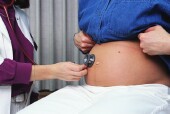Assisted Fertilization Risks May Be Due to Infertility
Single babies conceived this way have poorer outcomes, but procedure not at fault, study says.
|
E-mail this article
Subscribe to news
Printer friendly version
|

(SOURCE: The Lancet, news release, July 30, 2008)
THURSDAY, July 31 (HealthDay News) -- The increased risk of poor health outcomes among single infants conceived through assisted fertilization (AF) may be due to causes of infertility rather than the procedure itself, say Norwegian researchers.
In general, single babies conceived using AF have worse health outcomes than spontaneously conceived infants. But this difference is much smaller among women who've conceived both spontaneously and with AF, according the study authors.
They analyzed data on 2,546 women who conceived at least one child spontaneously and another after AF, and compared them to 1.3 million women who conceived spontaneously and 8,229 women who conceived through AF.
The researchers found that AF conceptions were associated with a 25-gram lower mean birth weight, a two-day shorter gestation, a 26 percent increased risk of being small for gestational age, and a 31 percent increased risk of perinatal death.
Among women who had one child spontaneously and another with AF, AF conceptions resulted in babies that were nine grams lighter and that had a 0.6-day shorter gestation. Both babies were almost equally small for gestational age, but the spontaneously conceived baby had an almost three times greater risk of perinatal death than the AF baby.
"Birth weight, gestational age and risks for small gestational age babies, and preterm delivery, did not differ among infants of women who had conceived both spontaneously and after assisted fertilization," Dr. Liv Bente and colleagues concluded in a news release. "The adverse outcomes of assisted fertilization that we noted compared with those in the general population could therefore be attributable to the factors leading to infertility, rather than to factors related to the reproductive technology."
The study was published online July 30 in The Lancet and was expected to be published in an upcoming print issue of the journal.
In an accompanying comment, Dr. Anja Pinborg, of Copenhagen University Hospital in Denmark, and colleagues wrote: "Considering that 1 to 4 percent of all newborns in Europe are conceived after assisted reproductive technology (ART), safety concerns are important. Reducing the number of multiple births has made improvements, but we need to gain a better biological understanding of the reasons why infertility and ovarian stimulation may have adverse effects on infant health. Consequently, we have to continuously monitor the short and long-term risks of ART."
More information
The U.S. National Women's Health Information Center has more about infertility.
Copyright © 2008 ScoutNews, LLC. All rights reserved. 
HealthDayNews articles are derived from various sources and do not reflect federal policy. healthfinder.gov does not endorse opinions, products, or services that may appear in news stories. For more information on health topics in the news, visit the healthfinder.gov health library.